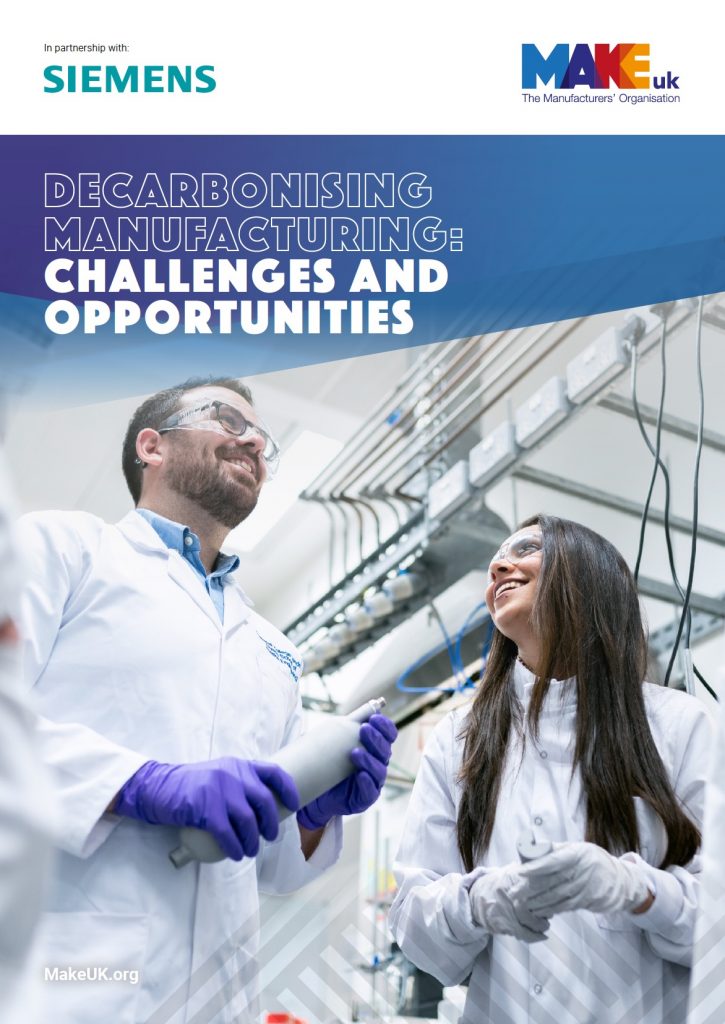Rising energy costs are driving accelerated carbon reduction efforts in the manufacturing sector, according to the latest research from Make UK which found that eight in 10 firms now see decarbonisation as a high or medium priority in their business.

The report – published in collaboration with technology company Siemens – says 46% of firms are already implementing their decarbonisation strategies, with a further quarter aiming to begin doing so within the next 12 months.
Energy efficiency is seen as the main pathway towards carbon reduction, with almost half of manufacturers citing this as the focus of their efforts. The main driver behind this is the rising cost of energy, cited by 52% of manufacturers, while 47% of companies said they were driven by doing the right thing and playing their part to meet net zero.
The report also highlights a number of key barriers facing companies – particularly smaller firms – and calls on the government to offer greater support to the sector including by incentivising investment in industrial decarbonisation through capital allowances and tax reliefs.
The cost of upgrading or replacing capital equipment was named as the biggest barrier for businesses in decarbonising their operations, followed by concern about remaining cost competitive. A lack of internal resource is also an issue for some companies alongside a lack of appropriate skills.
In addition, although a third of manufacturers agree that the strategies and initiatives that government has announced on decarbonisation will help them, the report says take up and understanding of this support has been mixed.
“While numerous strategies have been announced, progress has been limited at best. government must deliver regular updates to help business understand the government’s overall intentions and give them the confidence to make investment decisions,” said Make UK CEO Stephen Phipson.
“To turbo-charge investment in decarbonisation projects, government should introduce full expensing on green technologies and expand the R&D tax credit to include industrial decarbonisation. The Help to Grow programme should be expanded to Help to Grow Green, which would support business in their decarbonisation journey and supercharge green investment. Companies should also be incentivised to invest in on-site energy generation, where surplus can be added back to the national grid to improve the UK’s energy security.”
The report also acknowledges – as highlighted in the Climate Change Committee’s latest annual progress report – the importance of data collection in emissions reduction efforts, and adds that the implementation of new Industrial Digital Technologies grew in momentum during the pandemic with 13% of manufacturers now using IDTs as a focus of their decarbonisation pathways. “Although this is somewhere off where we need to be, we are beginning to see more and more companies digitalise to decarbonise,” the report says.
Just over a third of businesses surveyed said they had already saved money as a result of emissions reduction, through improved productivity by streamlining processes. Some 16% of companies also said sales increased thorough access to new markets as a direct result of decarbonising their business, while a further 14% said decarbonisation had helped them access targeted finance routes for new projects.
Siemens Digital Industries’ managing director Brian Holliday said: “It is heartening to see increased awareness and action from manufacturers with regards to sustainability. This is an industry-wide challenge that isn’t going anywhere, and transformation needs to accelerate at pace if we are to meet national carbon targets. Technology adoption, supportive government policy and ambitious decision making will help create a resilient and productive sector that is ready for the future.”

